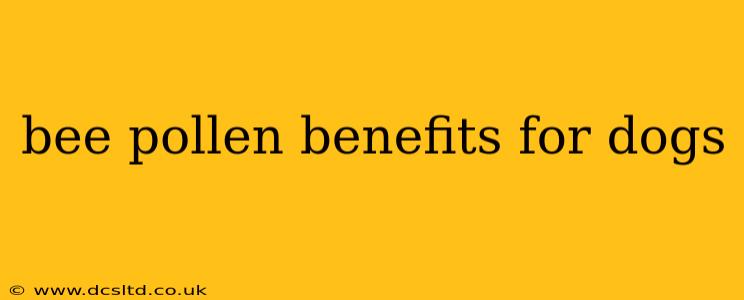Bee pollen, a nutritional powerhouse for humans, has also garnered interest as a potential supplement for canine companions. While research specifically on bee pollen and dogs is limited, its rich nutrient profile suggests several potential benefits. This article explores the potential advantages, cautions, and considerations surrounding bee pollen supplementation for your furry friend.
What is Bee Pollen?
Bee pollen is a naturally occurring substance collected by honeybees from flowers. It's a complex mixture of pollen grains, nectar, honey, bee saliva, and other components. This results in a diverse array of vitamins, minerals, amino acids, and antioxidants. The exact composition varies depending on the floral sources and geographic location.
Potential Benefits of Bee Pollen for Dogs
While more research is needed to definitively confirm the following benefits in dogs, the nutrient profile of bee pollen suggests it may offer:
-
Enhanced Energy Levels: The abundance of vitamins and minerals in bee pollen could contribute to increased energy and stamina, particularly in older or less active dogs. However, this is largely anecdotal and requires further scientific study.
-
Improved Immune System Function: The high concentration of antioxidants and vitamins like Vitamin C and Vitamin E may support a stronger immune system, potentially reducing the frequency and severity of illnesses. Again, rigorous studies focusing specifically on dogs are needed to confirm this.
-
Better Skin and Coat Health: Some believe the nutrients in bee pollen can promote healthier skin and a shinier coat due to its essential fatty acids and vitamins. Visible improvements are anecdotal and vary widely between dogs.
-
Increased Appetite: Some dog owners report that bee pollen can stimulate appetite in dogs with decreased food intake. Further research is required to verify this potential benefit.
-
Improved Digestive Health: The presence of probiotics and enzymes may support digestive health and regular bowel movements, although this is based more on the general properties of bee pollen and lacks specific research on canines.
What are the Risks and Side Effects of Bee Pollen for Dogs?
While generally considered safe, bee pollen can pose some risks:
-
Allergies: Dogs, like humans, can be allergic to bee pollen. Introduce bee pollen gradually and monitor your dog closely for any signs of allergic reactions such as itching, swelling, hives, vomiting, or difficulty breathing. If any allergic reactions occur, discontinue use immediately and consult your veterinarian.
-
Contamination: Bee pollen can be contaminated with pesticides, herbicides, or other substances depending on where it's collected. Choose high-quality, reputable sources to minimize this risk.
-
Interaction with Medications: Bee pollen may interact with certain medications. Consult your veterinarian before giving your dog bee pollen, especially if they are on any medication.
-
Gastrointestinal Upset: In some cases, bee pollen can cause mild gastrointestinal upset, such as diarrhea or vomiting, especially if given in large quantities.
How Much Bee Pollen Should I Give My Dog?
There's no established dosage for bee pollen in dogs. Start with a very small amount (a tiny pinch) and gradually increase the dosage over several days, carefully monitoring your dog for any adverse reactions. Always consult your veterinarian to determine the appropriate dosage for your dog's size, breed, and health condition.
Is Bee Pollen Safe for Puppies or Pregnant Dogs?
The safety of bee pollen for puppies or pregnant dogs hasn't been thoroughly studied. It's best to err on the side of caution and avoid giving bee pollen to puppies or pregnant/lactating dogs unless explicitly advised by your veterinarian.
Can I Give My Dog Raw Bee Pollen?
While some sources suggest raw bee pollen, it's generally recommended to use bee pollen that's been processed to reduce the risk of contamination. Your veterinarian can offer guidance on appropriate forms of bee pollen for your canine companion.
When Should I Consult My Veterinarian About Using Bee Pollen for My Dog?
Consult your veterinarian before introducing bee pollen into your dog's diet, especially if your dog has any pre-existing health conditions, is on medication, or is pregnant/nursing. Your veterinarian can provide personalized advice based on your dog's individual needs.
This information is for educational purposes only and should not be considered veterinary advice. Always consult your veterinarian before making any changes to your dog's diet or giving them any supplements.
